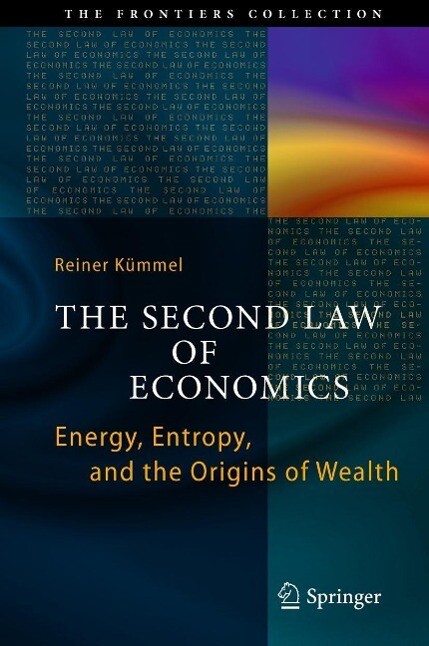
The Second Law of Economics - neues Buch
ISBN: 9781441993656
Nothing happens in the world without energy conversion and entropy production. Â These fundamental natural laws are familiar to most of us when applied to the evolution of stars, biologic… Mehr…
| Springer.com new in stock CH:::0.00 EUR. Versandkosten:zzgl. Versandkosten. Details... |

ISBN: 9781441993656
Nothing happens in the world without energy conversion and entropy production. These fundamental natural laws are familiar to most of us when applied to the evolution of stars, biologica… Mehr…
| Springer.com Nr. 978-1-4419-9365-6. Versandkosten:Worldwide free shipping, , DE. (EUR 0.00) Details... |

The Second Law of Economics - neues Buch
ISBN: 9781441993656
Nothing happens in the world without energy conversion and entropy production. These fundamental natural laws are familiar to most of us when applied to the evolution of stars, biological… Mehr…
| kobo.com Versandkosten:Zzgl. Versandkosten., zzgl. Versandkosten Details... |

The Second Law of Economics - neues Buch
ISBN: 9781441993656
The Second Law of Economics - Energy Entropy and the Origins of Wealth: ab 53.49 € eBooks > Fachthemen & Wissenschaft > Wissenschaften allgemein Springer-Verlag GmbH, Springer-Verlag GmbH
| eBook.de Versandkosten:in stock, , , DE. (EUR 0.00) Details... |

The Second Law of Economics - neues Buch
2011, ISBN: 9781441993656
Energy, Entropy, and the Origins of Wealth, eBooks, eBook Download (PDF), 2011, [PU: Springer New York], Seiten: 296, Springer New York, 2011
| lehmanns.de Versandkosten:Download sofort lieferbar. (EUR 0.00) Details... |

The Second Law of Economics - neues Buch
ISBN: 9781441993656
Nothing happens in the world without energy conversion and entropy production. Â These fundamental natural laws are familiar to most of us when applied to the evolution of stars, biologic… Mehr…
ISBN: 9781441993656
Nothing happens in the world without energy conversion and entropy production. These fundamental natural laws are familiar to most of us when applied to the evolution of stars, biologica… Mehr…

The Second Law of Economics - neues Buch
ISBN: 9781441993656
Nothing happens in the world without energy conversion and entropy production. These fundamental natural laws are familiar to most of us when applied to the evolution of stars, biological… Mehr…

The Second Law of Economics - neues Buch
ISBN: 9781441993656
The Second Law of Economics - Energy Entropy and the Origins of Wealth: ab 53.49 € eBooks > Fachthemen & Wissenschaft > Wissenschaften allgemein Springer-Verlag GmbH, Springer-Verlag GmbH

The Second Law of Economics - neues Buch
2011, ISBN: 9781441993656
Energy, Entropy, and the Origins of Wealth, eBooks, eBook Download (PDF), 2011, [PU: Springer New York], Seiten: 296, Springer New York, 2011
Bibliographische Daten des bestpassenden Buches
| Autor: | |
| Titel: | |
| ISBN-Nummer: |
Detailangaben zum Buch - The Second Law of Economics
EAN (ISBN-13): 9781441993656
ISBN (ISBN-10): 1441993657
Erscheinungsjahr: 2011
Herausgeber: Springer New York
293 Seiten
Sprache: eng/Englisch
Buch in der Datenbank seit 2012-04-02T11:04:05+02:00 (Berlin)
Detailseite zuletzt geändert am 2023-09-27T01:34:59+02:00 (Berlin)
ISBN/EAN: 1441993657
ISBN - alternative Schreibweisen:
1-4419-9365-7, 978-1-4419-9365-6
Alternative Schreibweisen und verwandte Suchbegriffe:
Autor des Buches: fresenius, reiner kümmel, kumm, kummel
Titel des Buches: economics, the origins value, entropy, the second law
Daten vom Verlag:
Autor/in: Reiner Kümmel
Titel: The Frontiers Collection; The Second Law of Economics - Energy, Entropy, and the Origins of Wealth
Verlag: Springer; Springer US
296 Seiten
Erscheinungsjahr: 2011-06-24
New York; NY; US
Sprache: Englisch
53,49 € (DE)
55,00 € (AT)
59,00 CHF (CH)
Available
XX, 296 p.
EA; E107; eBook; Nonbooks, PBS / Physik, Astronomie/Theoretische Physik; Kybernetik und Systemtheorie; Verstehen; Economic growth; Econophysics; Energy accounting; Energy analysis; Energy economics; Entropy and climate change; Entropy and pollution; Output elasticities; data-driven science, modeling and theory building; C; Complex Systems; Energy Policy, Economics and Management; Sustainability; Environmental Economics; Thermodynamics; Physics and Astronomy; Umwelt; Nachhaltigkeit; Umweltökonomie; Thermodynamik und Wärme; BC
References
2.8 Appendix B: Energy Units References
3.7.3 Density of Entropy Production References
4.7 Summary and Discussion References
References
GLOSSARY
INDEX
From the reviews:
“The second law of economics by Reiner Kümmel is divided into five chapters. Lots of mathematical expressions, derivations, and interpretations are given which are useful for scientists in this area. This is an interesting book written by a physicist with an interdisciplinary approach suited to the scientific minded as well as non-specialist audience. The author nicely incorporates energy, entropy, and technological concepts into the models of economic development.” (P. N. Rathie, Mathematical Reviews, December, 2013)
. The book discusses the impact of two fundamental laws of nature—energy conservation and entropy production—on the creation and growth of wealth....[The author] argues in a clear and simple way that energy conversion is an essential force in wealth creation and a force to be reckoned with in the crafting of economic policy….
. After all, understanding that law now can help us guarantee the prosperity of future generations.”
, December 2011
The Second Law of Economics: Energy, Entropy, and the Origins of Wealth The Second Law of Economics The Second Law of Economics Physics TodayNothing happens in the world without energy conversion and entropy production. These fundamental natural laws are familiar to most of us when applied to the evolution of stars, biological processes, or the working of an internal combustion engine, but what about industrial economies and wealth production, or their constant companion, pollution? Does economics conform to the First and the Second Law of Thermodynamics? In this important book, Reiner Kümmel takes us on a fascinating tour of these laws and their influence on natural, technological, and social evolution. Analyzing economic growth in Germany, Japan, and the United States in light of technological constraints on capital, labor, and energy, Professor Kümmel upends conventional economic wisdom by showing that the productive power of energy far outweighs its small share of costs, while for labor just the opposite is true. Wealth creation by energy conversion is accompanied and limited by polluting emissions that are coupled to entropy production. These facts constitute the Second Law of Economics. They take on unprecedented importance in a world that is facing peak oil, debt-driven economic turmoil, and threats from pollution and climate change. They complement the First Law of Economics: Wealth is allocated on markets, and the legal framework determines the outcome. By applying the First and Second Law we understand the true origins of wealth production, the issues that imperil the goal of sustainable development, and the technological options that are compatible both with this goal and with natural laws. The critical role of energy and entropy in the productive sectors of the economy must be realized if we are to create a road map that avoids a Dark Age of shrinking natural resources, environmental degradation, and increasing social tensions.
Reconsiders economics from the perspective of natural laws Shows how energy and its conversion into physical work accounts for most of the growth that mainstream economics attributes to technological progress and related concepts Describes energy needs and options for the future Explores consequences for economic growth and environmental sustainability Includes supplementary material: sn.pub/extras
Weitere, andere Bücher, die diesem Buch sehr ähnlich sein könnten:
Neuestes ähnliches Buch:
9781461429197 The Second Law of Economics: Energy, Entropy, and the Origins of Wealth (The Frontiers Collection) (Kümmel, Reiner)
- 9781461429197 The Second Law of Economics: Energy, Entropy, and the Origins of Wealth (The Frontiers Collection) (Kümmel, Reiner)
- 9781441993649 The Second Law of Economics: Energy, Entropy, and the Origins of Wealth (The Frontiers Collection) (Kümmel, Reiner)
- The Second Law of Economics: Energy, Entropy, and the Origins of Wealth (The Frontiers Collection) by Reiner K??mmel (2011-06-28) (Reiner K??mmel)
< zum Archiv...



